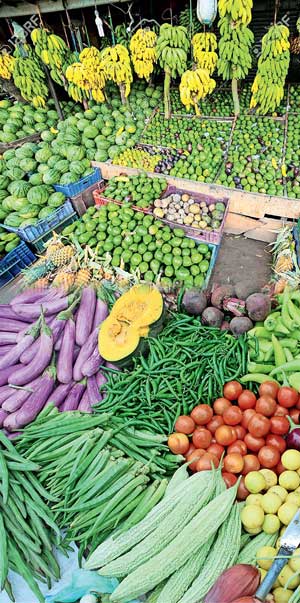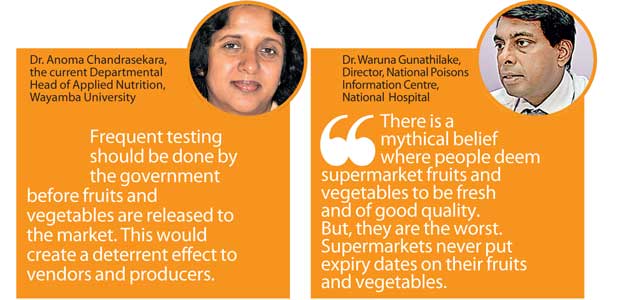Reply To:
Name - Reply Comment

Street vendors who sell fruits and vegetables are an integral part of urban economies around the world, offering easy access to a wide-range of goods and services in public domain. Most street vendors provide the main source of income for their households. This informal form of economy adds a bit of glamour to the streets of any metropolis, which are otherwise dull. However, many of us do wonder if the vegetables and fruits sold by the roadside are safe for consumption. Though there is much talk and research about the subject of public health and food safety, it is disappointing to observe that the implementation of food safety measures remain an often neglected issue.

In India, there have been many cases filed in that regard. On April 30, 2014, a plea had been filed in the Delhi High Court seeking an immediate ban on the sale of fruits and vegetables which contained artificial colour and harmful preservatives. A division bench of Chief Justice G. Rohini and Justice R.S. Endlaw, agreeing to hear the Public Interest Litigation (PIL), posted the plea for May 21 and clubbed it with another petition that relates to pesticides in fruits and vegetables.
In another shocking case, a court came down heavily on food adulteration, terming it a menace to public health, while sentencing a senior citizen to 18 months in jail for mixing synthetic colour with pulses. Chief Metropolitan Magistrate Gaurav Rao said, “Adulteration of food is a menace to public health,” as he convicted and sentenced 66-year-old Satya Prakash Jain under various sections of the Prevention of Food Adulteration Act. (Source: NDTV News- New Delhi Television Limited).
Sri Lanka also has a similar act: the Food Act No. 26 of 1980, which is headed by the Health Minister with the Health Services Director General assuming total administrative and executive responsibilities in addition to his other duties. We are rather far behind the food safety trends followed by more developed economies; however, the act retains basic food safety standards that a country should follow. The core responsibilities of a National Food Authority should include the imposition of regulatory measures, monitoring system performance and ensuring continual improvements in keeping with global trends. The establishment of modern laboratories will also facilitate the food safety system of our country. The inherent defect, however, in the food control and food safety system in our country is its absolute inability of enforcement. The Food Act itself recognises the imperatives of food safety as identified by international bodies such as the WHO. Though the act manifestly reads that its provisions are compulsory, it makes no attempt to implement them.
Situation in Sri lanka
As food safety in our country remains an issue that concerns all citizens, the interviewed a few experts in the area of food safety to ascertain whether consuming fruits and vegetables from street vendors was safe for consumption.
“There are many factors to be considered before eating fruits and vegetables bought from the pavement. Though air pollution stands as the prime issue, it is not the only one. There are many chemicals that are injected into fruits and vegetables to preserve them. If we take plantains for an instance, the plantains we find on the pavement will be bright in yellow colour. However, although the colour is inviting, the banana is tasteless. This is because of the heavy use of chemicals. It is very unfair on other fruit stalls that display quality fruits and vegetables. Since some vendors do not sell high-quality products, it affects the honest vendor as well. This problem can be rectified with proper standards and checking,” said Dr. Anoma Chandrasekara, the current Departmental Head of Applied Nutrition, Wayamba University and Senior Lecturer of Food and Nutrition. She also functions as Vice President of the nutrition society of Sri Lanka.

Precautions consumers could take when making purchases
“Another problem is the fact that fruits and vegetables which are sold on the pavements are not covered. Hence, they are exposed to dust and other microbes. We should not stop ourselves from making purchases from local vendors, but we should be cautious. For example, if we buy an apple from the pavement, we should wash it before peeling. Though the apple peel is rich in antioxidants and many other nutrients, we should necessarily peel it as it is most likely ridden with pollutants. Further, if a fruit is damaged or infected, then we should throw it. It is unfair for consumers to take such stringent precautions, but because of the lack of standards, one must be more cautious than usual when it comes to fresh food items. If we buy fruits and vegetables from the roadside, we should not make our purchases from the same source because that one particular source might use the same chemicals and preservatives in all their vegetables and fruits.
Transportation and storage
Dr. Waruna Gunathilake, Director, National Poisons Information Centre, National Hospital, said even before the fruits and vegetables reach the market, they would be polluted as safety regulations are not taken when transporting them.
“As fruits and vegetables are transported in the open, they will be in direct contact with the environment which is mixed with chemicals such as Cadmium, Sulphur, Lead and so forth. There are also many heavy metals in the air. These chemicals can easily get deposited on these vegetables and fruits. Transportation of food is a big issue in our country. However, in developed nations, fruits and vegetables are transported in closed containers and stored in cooled conditions to lock in the nutrients. Anyone who is travelling on the roads of Sri Lanka would be able to observe the manner in which fruits and vegetables are being transported. People are either using them as a comfortable cushion or they keep falling out of the truck. This shows where our food safety system stands. The prime quality food can be observed in the European market. Their ways and means of transportation, marketing and storage have very high standards.”
Supermarkets and roadside fruit vendors
Dr. Gunathilake also spoke about fruits and vegetables displayed in supermarkets.
“There is a mythical belief where people deem supermarket fruits and vegetables to be fresh and of good quality. But, they are the worst. Supermarkets never put expiry dates on their fruits and vegetables. They place these items after spraying them with water and various chemicals to make them look fresh. Since there is no expiry date and they appear to be fresh, we add it to our cart,” he said.
In the instances supermarkets and vendors actually cover the fruits and vegetables, the plastic they use is substandard.
Further elaborating on this fact, Dr. Waruna said, “when we see a fruit salad cup in a supermarket, we find it covered with polythene. Conscious consumers always wonder if the covering is food grade plastic (this plastic has excellent chemical resistant properties making it suitable for a wide-range of foods and other products). No one has ever brought this fact to light. It must be questioned from supermarket chains. Food grade is the safest polythene in the market. To identify food grade plastic, there should be a symbol of a wine glass and pork; this is the international symbol. However, I have never observed this symbol on any of the plastic coverings in supermarkets. This is a huge weak point in food safety in our country.”
Solutions
In the defence of roadside vendors, Dr. Chandrasekara said, “however, fruit vendors should not get a bad reputation as their revenues depend on us. For the satisfaction of both vendors and customers, the government should play a pivotal role in policy standards and checking.”
“To assure the quality of vegetables and fruits, ideally there should be a mechanism to check the chemical residue on the surface of these goods. Frequent testing should be done by the government before fruits and vegetables are released to the market. This would create a deterrent effect to vendors and producers. Even though there are such food safety policies, they are frail and/or non-functional. The government must ensure the enforcement of such disciplines to create a safer consumer-producer environment. The solution is simple, all the policies are in place, but they need to be implemented,” Dr. Chandrasekara added.